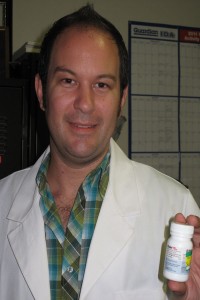Students turn to prescription drugs to help focus
By Katrina Geenevasen

NAPANEE, On. (09/09/11) Jason Hagar, pharmacist at Gray's IDA in Napanee, says students who don't medically require Ritalin should avoid taking it. Photo by Katrina Geenevasen.
They’re being coined as smart drugs.
In an effort to improve grades, more and more secondary and post-secondary students are using prescription drugs they don’t really need.
After rhyming off all the symptoms of a patient with Attention Deficit Disorder (ADD), they are strolling out of doctor’s offices with legal prescriptions for drugs like Ritalin, Adderall and Dexedrine for non-medical reasons
These prescription drugs that stimulate the central nervous system are most often used to treat ADD. But more and more, students are being led to believe they can also be used to improve concentration and focus.
However, for those who don’t medically require them, taking prescription drugs can be dangerous. The stimulants can cause death, hypertension, heart rhythm disturbances, and serious overdoses if a doctor is not properly monitoring them. They can also cause dependency and depression.
Jason Hagar, a pharmacist at Gray’s IDA in Napanee, said the risks outweigh the supposed benefits of concentration and focus for those who don’t medically require the medications.
“I would say the addictive potential would be one of the biggest issues,” said Hagar. “There are also cardiac implications from amphetamines.”
However, he sees why some students could fall victim to the quick fix.
“I could see maybe that the stresses of doing well and the pressures to be the top of the class or to move on, or what their family expectations are, that they would think they need something to get them going because so much is hinging on their success.”
He added that while some students may think prescription drugs are the only way to deal with stress and fatigue, there are other options out there.
He says vitamins can be a much safer alternative for those who don’t medically require a prescribed medication.
“There are some other things to help with focus,” said Hagar. “One of the popular vitamins for mental clarity and improving sleep cycles, giving you more ‘get up and go pep’, and for well-being would be B50.”
Hagar says there are many benefits within the B50 vitamin capsule.
“They strengthen the mind, and reduce stress,” said Hagar.
He also has a warning for students who are considering taking prescription drugs to help them concentrate.
“If someone was going to do it they would have to be educated, and should know that it should be short-term. The longer they use the drug, and the number of months or years that they are on it could re-pattern their brain and make it more difficult for them to get off of it.”
While the stresses of college can be overwhelming at times, Loyalist College student Codi Brown says she has never turned to “performance enhancing” drugs to help her cope.
“I’ve never felt the need that I had to,” said the second-year student.
“The teachers are great,” said Brown. “If we needed help, they would come see us. Or we could go see Student Success if we were having any troubles, so I found it really easy to cope.”
Brown says despite what drugs like Ritalin can do to improve grades, she doesn’t understand why students would use them if they didn’t medically need to.
“It can become an addiction,” said Brown. “You’d be needing it all the time if you started. It wouldn’t be that great. If you don’t need it, why take it?”
First-year Loyalist student Shannon Dillion feels the same way, but added that ultimately, it’s a personal choice everyone is entitled to.
“I would be surprised if someone admitted something like that to me, but if they feel that they need it, then it’s a free world if they want to,” said Dillon. “ But I don’t think it’s a good idea, especially because there are probably a lot of people who do need it that aren’t getting it.”
 Print This Post
Print This Post






